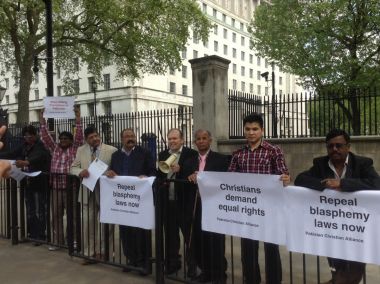British Pakistani Christians protest blasphemy laws at Downing Street

While David Cameron met with Pakistani Prime Minister Nawaz Sharif on Wednesday, Christians took to the street outside 10 Downing Street to protest the misuse of blasphemy laws that have resulted in the imprisonment of many believers in Pakistan.
The laws stipulate that anyone who "directly or indirectly defiles the sacred name of the Holy Prophet Muhammed (peace be upon him)" is liable to be punished with a fine, life imprisonment or the death penalty.
It has been blamed for much of the persecution against Christians in Pakistan and for increasing inter-religious tensions across the country.
Minority faith groups live in constant fear of punishment, as human rights groups say that the laws are frequently misused by extremists. False charges are often brought against Christians in particular to settle personal scores or to seize property or businesses.
In an article on Conservative Home, MP for Gillingham and Rainham Rehman Chishti notes the sharp increase in reported cases of blasphemy in recent years.
"In the past 15 years, 1,274 people have been charged under the laws in comparison with nine reported cases between 1929 and 1982," he reveals.
"These have been used to persecute and prosecute the Christian community and they tarnish Pakistan's name and reputation.
"These laws are, as the Minister admitted during my recent debate on this subject in Parliament, "dangerous" and "open to abuse for personal gain."
The British Government has in the past called upon Pakistani authorities to ensure greater protection for those who are wrongly implicated by this law, and Mr Cameron earlier assured that he would speak with Mr Sharif about the issue during his three-day official visit this week.
The Pakistan Christian Alliance nonetheless decided to stage the protest on Wednesday in solidarity with believers in the country, a move which was supported by the Centre for Legal Aid, Assistance and Settlement (CLAAS-UK).
Director Nasir Saeed labelled the demonstration "timely".
"I hope that today Mr Cameron will have raised the issue of the misuse of blasphemy laws with the Pakistani Prime Minister - as he assured Parliamentarians during PMQs," Saeed said.

"I also hope that Mr Sharif takes this matter seriously and has given some assurance to Mr Cameron that he will look into the matter, as Pakistani Christians believe that blasphemy laws are the root cause of their persecution.
"Pakistani Christians demand the repeal of the discriminatory law which is increasingly being used within Pakistan to persecute religious minorities...Christians in Pakistan feel unsafe and are being forced to flee the country that they helped build."
Saeed also noted his disappointment that the matter has not yet been brought before the Pakistani Parliament. "I hope that Mr Sharif will look into this long standing issue and will make all possible efforts to stop the ongoing misuse of the blasphemy laws and persecution of Christians," he said.
"It is important to improve the image of the country and image of Islam as people are being killed in the name of the religion," he concluded.
My Chisti agrees, writing that the British Government must adopt policies which ensure the protection of civilians worldwide. "We can, as an ally, use our influence to urge the country to reform the outdated laws which deprive people of their basic human rights," he notes.
"Our foreign policy towards Pakistan should promote respect for human rights, for freedom of religion and for belief."
Asia Bibi, a Pakistani Christian mother of five facing the death penalty for alleged blasphemy remains incarcerated. Her appeal has not yet been rescheduled.











